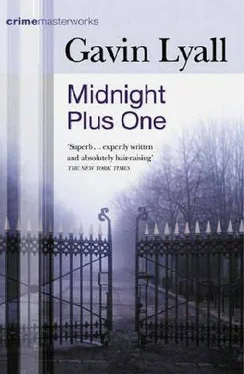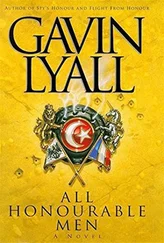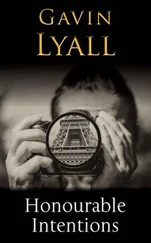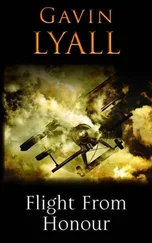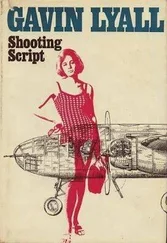'Congratulations. Well, you're captain of those two now. Bring them about ten yards behind me – keep me in view down the une of trees. When I stop, you stop. If I turn off, you turn off immediately – don't come up to where I turned. You see what I mean?'
'Yees. But shouldn't it be Harvey-?'
'Itshould be,' I said grimly. 'But as things are, I'd rather it was you. All right?'
She nodded. I stood on one strand of wire, pulled up another, and they climbed through without much more noise trían a bad car crash. I moved out ahead and started through the precise files of trees.
I made twenty yards, then thirty, then forty. In among the trees, it was lighter than I'd expected. And when I looked back, the girl had used the light, and her head, and was keeping them farther behind than the ten yards I'd specified.
I made fifty yards, and guessed I must be in the middle of the orchard by now. I looked ahead for the skyline between the trees that would mark the next fence, but all I could see was the regular glow of the beacon.
I stopped. It took me a moment to think why, and in that moment the three behind me sounded a stampede of wild elephants. Then they stopped. And I knew why I had: a faint scent of tobacco smoke.
The sergeant would have told them not to smoke, of course – but that had probably been back around midnight, five-hours ago. Cold, wet, dull hours. So you lie down on your side and strike a match under your jacket, then keep the burning end hidden in the grass, leaning down to take a puff. But you can't hide the smell.
But where was it coming from? I licked a finger and held it up to test the wind, and, as usual, it felt cold all the way round. I breathed out, but it wasn't cold enough to condense my breath. All I knew was that there hadn't been much wind out in the field and there was even less among the trees.
Next move, please.
I tried to remember the voice of an ex-sergeant of the Foreign Legion who'd instructed on small arms to the Resistance in the Auvergne, and bellowed:'II y a un idiot qui fume! C'est comme un bistro, ici! Où êtes-vous?'
There was a startled rustling ahead on my right, then a hush that was almost as loud.
I tiptoed gently away to the left. When I looked back, Miss Jarman was moving them parallel to me.
I let out another shout of:'Où est l'idiot qui fume?'in the hope that if they realised I was moving away from them, the last thing they'd do would be answer or come and find me.
We moved sideways almost to the edge of the orchard, then I turned back towards the airport beacon. After another forty yards, I could see a hedge. I turned back to bring up the other three.
Miss Jarman whispered: 'I thoughtwe were making a noise – until I heard you.'
'We nearly walked into a squad of gendarmes. Sounding like the sergeant is a good password.' I nodded at the hedge. 'There's a road there, and a French customs post just down on the right. It's a straight road and we've got to cross without being spotted.' I turned to Harvey. 'How are you feeling?'
'I think I died. Does God know you're starting the Resurrection early?'
I grinned and began to feel a bit better myself. His voice was still thick, but it had lost the dull petulant tone. He was beginning to think again. I led the way to the hedge.
When we'd found a place we could crawl through, I stuck out my head. The customs post was there all right, hardly more than a hundred yards away. A small bungalow flooded with light, with a couple of parked cars, and several people just standing around.
At that distance they wouldn't hear us – but we'd be crossing straight into the glare of the airport beacon, throwing out its several-thousand-candlepower only a few hundred yards away by now. And some of the men at that bungalow would be there just to keep a watch up this road.
I pulled my head back. 'Sorry. We're going to have to move a bit back up the road before we cross.'
Behind us, somebody called softly:'Qui va là?'
Miss Jarman whispered: 'It looks as if your password's worn off.'
She was right. By now it must have struck them as odd that the sergeanthadn't found them. By now they were looking for him. Now, we had to cross where we were.
Up the road, in the opposite direction from the customs post, an engine hummed. Then something coming fast, its headlights blazing, rushed past us. The girl ducked: Harvey and I froze. Maganhard just went on being Maganhard.
When it had passed, I hissed at the girl: 'If there's a light on you, stand still; they notice movement more than anything.'
She straightened up slowly. 'And when it gets a bit quiet, give a shout. Yes, I'm learning the rules.'
Harvey said: 'D'you see what that was? Your girlfriend's van. The Clos Pinel truck.'
I rammed my head through the hedge again. The van was just pulling up at the customs house, people running out to yank open its doors.
The damn fool! Why was she taking this risk? But I knew why. I'd told her the route I planned, and she'd known this road would be the difficult place. So she'd waited somewhere until we'd had time to reaeh it – then come charging up.
They'd be pretty suspicious of her: a van that could easily hold four passengers, from a place not far from yesterday's shooting, coming on an odd route at an odd time. But she'd known that, of course – and was deliberately using it to distract them.
'Through the hedge,' I snapped. 'Quick! '
Harvey piled through, without asking questions. I shunted the girl after him, then Maganhard. Then myself. Long before Ginette was clear of the customs we were safe on the other side.
I wanted to stay and make sure she got through okay, but that might waste everything she'd gained for us. We had to move on. It was an old rule.
We went crouched, along a hedge towards the airport. Now the beacon was flashing straight in our faces. The high fence was only two hundred yards ahead.
Miss Jarman asked: 'We're going to come up against the airport, aren't we?'
'That's the idea. They had to borrow some French territory to lengthen their runway a few years ago; now the frontier runs along the fence, here. Once we're in the airport we're in Switzerland.'
Harvey said: 'Airports don't have the sort of fences you can just climb through.'
'I know. I borrowed some wire-cutters off Ginette.'
A couple of minutes later we reached the fence.
It was seven or eight feet of strong wire mesh strung between metal posts. I got the long-handled wire-cutters out of my briefcase and chewed away at a strand. It snapped with a loud click. I tried the next one more carefully, but still got a click. It was going to be a slow job: the mesh was only two inches wide and I had to cut a vertical slice about three feet high to give us a flap I could bend back.
Suddenly light poured over me. A searchlight, coming -impossibly – from the middle of the air. I froze. Then, behind the light, the soft whistle of throttled-back jets. An airliner on the approach had switched on its landing light.
I stayed still. The pilot would never see us, but the light could silhouette us for anybody in the fields behind us.
The airliner hit the runway with a squeak of rubber, then a sudden roar as the jets went to reverse thrust for braking. Under that noise, I snipped up the fence as fast and silently as scissors going through chiffon.
I turned to Maganhard. 'Welcome to Switzerland.'
From there it was fairly simple. Geneva-Cointrin is just one long runway with narrow grass areas on both sides. The airport buildings and workshops were all on the'far side; on ours, there were just heaps of building materials, banks of bulldozed earth that somebody hadn't got around to smoothing down, little brick huts that had something to do with power or radar or somesuch. Plenty of cover.
Читать дальше
